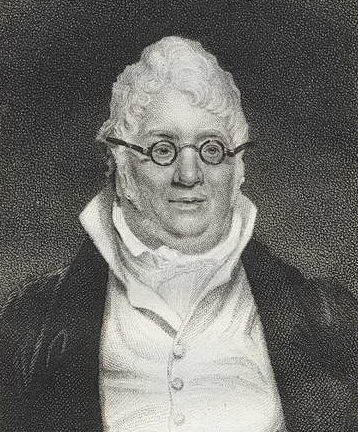|
Number 3. June 2016: A Vauxhall Song-Book
|
|
|
|
fig.1. Portrait engraving of James Hook by Thomas Blood after Samuel Drummond, 1813 |
| Always at the centre of the entertainment at Jonathan Tyers's pleasure garden was music and song; in the early days this was the work of the composers Handel, Arne and Boyce, but later, the greatest and most prolific of Vauxhall's composers was James Hook (fig.1), little known today, but hugely popular in his time. Born in Norwich in 1746, Hook was appointed music director at Vauxhall aged 28, having already supplied the gardens with some early songs. He stayed in post for forty-six years, during which time he is credibly reputed to have composed over two thousand popular songs; these not only provided a huge amount of entertainment for visitors, who demanded a brand new repertory of songs every season, but also a regular supply of published song-sheets which could be sold at Vauxhall and elsewhere, both for profit and for publicity. |
|
|
|
fig
2.
|
| Hundreds of the most popular of these song-sheets were gathered together into Vauxhall Song-Books. In the 1760s and '70s, more than a dozen composers, including several of the Vauxhall band, joined Dr. Arne, J.C. Bach and James Hook in producing Vauxhall songs, which were quickly published both in single sheets and in book form, but between 1767 and 1804, more than seventy of these volumes, entirely made up of songs by James Hook for Vauxhall Gardens, were produced, each containing from four to twelve songs; in the 1780s and '90s, Hook had a virtual monopoly of the song-books. This month's Object is one of these books (fig.2), published in 1799, which has a particularly interesting history. |
| The book itself is not in tip-top condition, and its last owner but one, an unknown American from Massachusetts, USA, clearly thought so little of it that they threw it in a skip (or dumpster). Its next owner cleverly spotted it lying there unwanted, and retrieved it as something interesting and appealing; she is an artist, and was going to cut up the pages for use as a collage in a new work of art. Before wielding the scissors, however, she had the presence of mind to look on the internet to see if there might be anybody out there who was interested in the book as it stood. My website was the first to catch her eye, so she contacted me with the story. Having ascertained how much she would have made from her collage, we agreed on a price, and a few days later the book arrived back in England, after over two hundred years in America. |
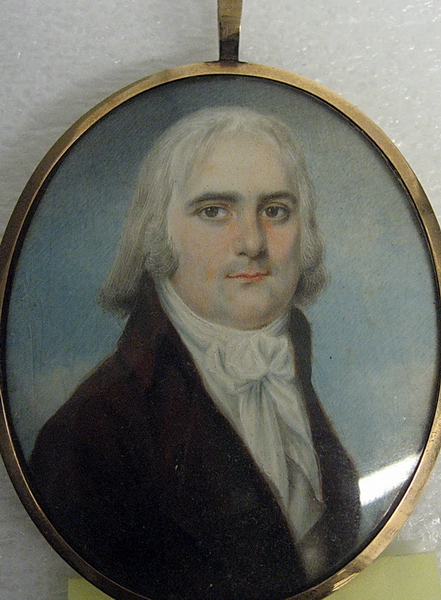 |
|
fig.3.
Miniature portrait of
Joseph Dunderdale by an unknown artist,
Museum of the City of New York, 43.393
|
| The volume had been taken to his new home in the USA by its first owner, a Leeds cloth merchant called Joseph Dunderdale, who emigrated there soon after 1800. There is a miniature portrait of Dunderdale himself, painted after he had travelled from Butts Court in Leeds to Brooklyn, New York (fig.3). This shows a down-to earth man, probably in his thirties, with intelligent eyes and a slightly sardonic smile, with no pretensions to grandeur. This forthright Yorkshire businessman clearly still had a sentimental attachment to his early years in England, and maybe even to a youthful visit to London and a trip to Vauxhall; he could not bear to be parted from his Vauxhall songs, so he took the precious volume to America with him. While there, he added many more song-sheets to the book before having it properly bound, by Brown & Stansbury, on Water Street, New York, opposite the Old Coffee-House. |
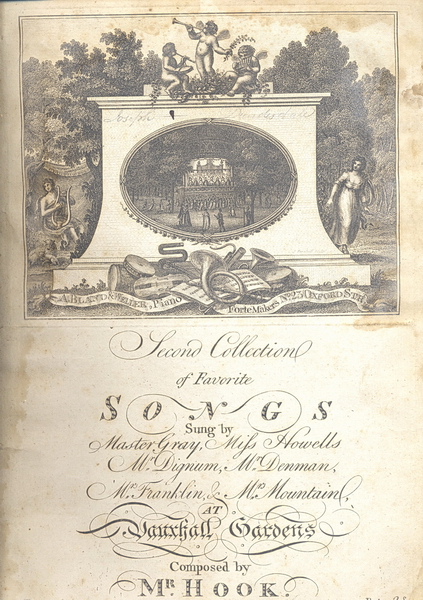 |
|
fig.
4. A Second Collection of
Favorite Songs, sung by Master Gray, Miss Howells, Mr. Dignum, Mr. Denman,
Mrs. Franklin & Mrs. Mountain at Vauxhall Gardens. Composed by Mr Hook,
1799
|
| Although many different Vauxhall song-books were produced between 1745 and 1848, few of them survive, and even fewer survive intact, with their engraved title page and all songs. This example, called A Second Collection of Favorite Songs, sung by Master Gray, Miss Howells, Mr. Dignum, Mr. Denman, Mrs. Franklin & Mrs. Mountain at Vauxhall Gardens. Composed by Mr Hook, 1799, is unusually complete with its title page (fig.4) and all eight songs, as well as the 26 songs added by Dunderdale in America. |
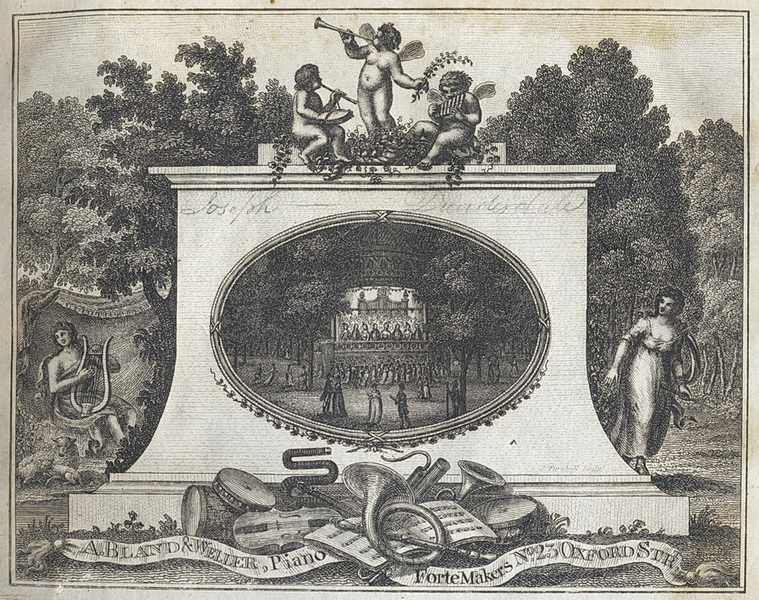 |
|
fig.
5
|
| Above the finely engraved text of the title page is an illustration of a stylised plinth in a wooded garden framing an oval view of the Vauxhall Orchestra, as it looked at that time, with the musicians and eight singers performing (fig.5). |
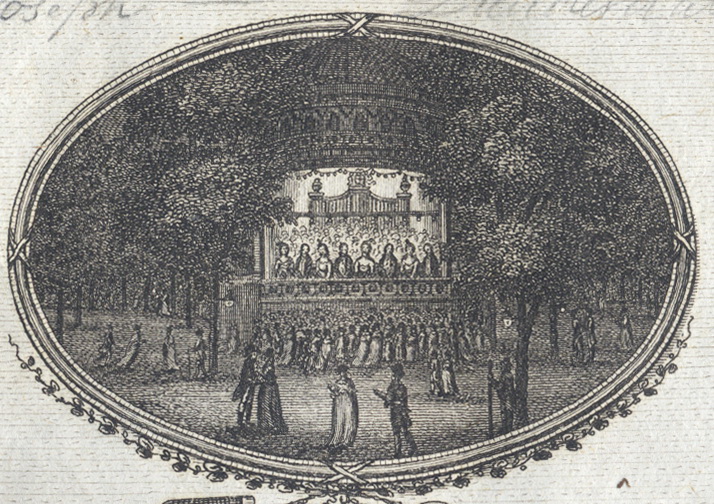 |
|
fig.
6
|
| This illustration, or versions of it, became the standard title-page decoration for Hook's song-books of this period, first used several years earlier; the last time eight singers, four male and four female had been employed for the season, as shown in this illustration (fig.6), was in 1792. Around the plinth are musical trophies, musical cherubs and classical figures, all adding to the Arcadian feel of the composition. On a ribbon below the plinth is the publisher's name – A. Bland & Weller, who, at their premises on Oxford Street, London, also made and sold piano-fortes. At the top of the plinth, Joseph Dunderdale has inscribed his own name, in pencil, as he has throughout the book, as though he were scared of losing it. His name is also stamped, in gold leaf, in large, clear Roman capitals, on a red leather label on the front cover. |
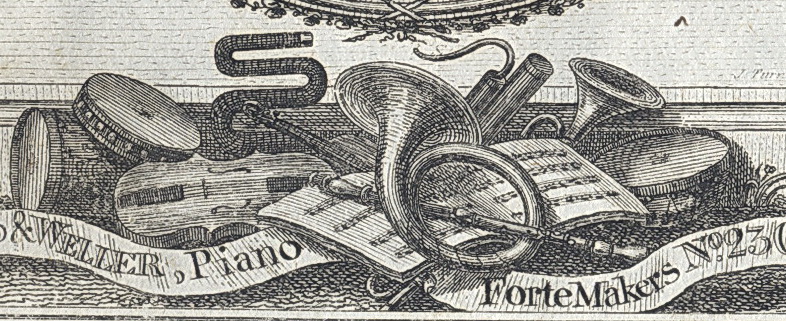 |
|
fig.
7
|
| The music trophy on the title page (fig.7) includes several instruments, which may provide some evidence as to the make-up of the Vauxhall band in Hook's period. We can discern two members of the string family – possibly a viola and a violin; two woodwind - the bassoon and the oboe; three from the brass section – a French horn, a serpent (although this is sometimes given to the woodwind), and a trombone; and lots of percussion – a military side-drum, a tympanum, and something that looks like a tambourine or jingle-drum, with little bells around its edge. If we add a keyboard, this mix does give a reasonable idea of the Vauxhall band which accompanied the singers. |
| The fact of this book's arrival in America is by no means unusual. Vauxhall songs travelled all over the English-speaking world, and could be found in some distinguished collections. US President Thomas Jefferson had a significant collection of Vauxhall songs in his library at Monticello. Australian libraries and museums also hold several examples. So Dunderdale was not alone in his attachment to a book that had probably become a nostalgic reminder of his younger carefree days at home in England. |
| It seems that Joseph Dunderdale thrived in New York; he appears in the city's business directories as a cloth merchant up to 1850; his business premises at 60 Maiden Lane, and home at 25 Greenwich, were both shared with a relative living at the same address, probably his son, called Forbes Dunderdale. Maria S. Dunderdale, who must have been his daughter, was at school in 1841, later moving on to a seminary. No mention is made of Joseph's wife. By the end of the 1840s, when Joseph would have been in his sixties or seventies, he had moved both his business and home to Long Island, leaving Forbes at Maiden Lane, which was probably their main showroom. In 1849 he was living in New Utrecht, Long Island, and his business premises, probably no more than a warehouse, was at 47 Nassau. Whether he took his song book everywhere with him is not known, but it would be fascinating to know how it travelled from Brooklyn to Lenox in western Massachusetts. |
| At a price of three shillings for just eight songs, and at a time when at least three separate song-books were produced each year, these volumes were expensive, and would have had a limited market, only amongst the elite and wealthy – they would not have been produced in huge numbers for a mass audience. They were intended to be kept in elegant drawing-rooms, ready for any occasion when impromptu entertainments may be required, allowing young ladies and gentlemen to show off their prowess at the keyboard or their virtuoso singing voice, by performing the latest songs to be made popular by celebrity singers at London's famous Vauxhall Gardens. The following year, a whole new crop of about forty songs would appear, rendering last year's song-book immediately redundant, so these books, apart from being expensive, often had a very short useful life. |
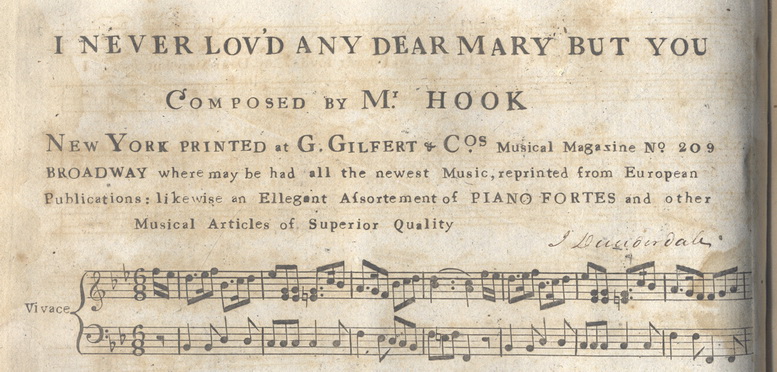 |
|
fig.
8
|
| The bonus of this book is that the extra song-sheets provide good evidence of the early music-publishing industry in American cities, as well as examples of true American popular songs, like Dear Mary, or Adieu to Old England, published by J. Hewitt in New York, a song which must have been written in America for an expatriate audience. Hewitt, whose premises were at 131 William Street and at 59 Maiden Lane (next door to Dunderdale's business premises), also imported and published current English songs, like Lucy, or Selim's Complaint, by James Hook, also published by B. Carr in Philadelphia and J. Carr in Baltimore. In New York, besides J. Hewitt, some of these songs were published by J.C. Moller (58 Vesey Street) and G. Gilfert (177 or 209 Broadway) (fig.8). Most of the US song-sheets were published in New York, but two of them – O Come Sweet Mary, Come to Me sung by Mr Hardinge at the New Theatre, in the Opera of the Rival Soldiers, and The Birth of Crazy Jane, words by Henry James Pye, music by John Bernard Sale – were both published in Philadelphia by G. Willig of 185 Market Street; Baltimore and Boston are mentioned elsewhere in the book. |
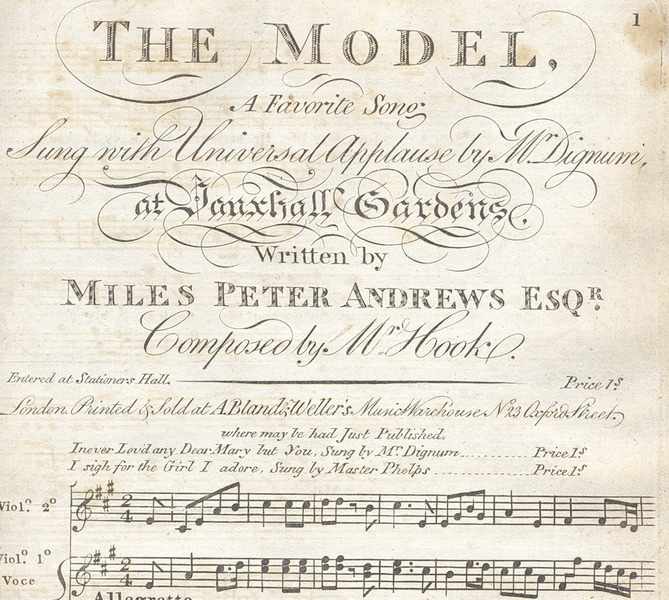 |
|
fig.9
|
| Only two of the additional songs were originally written for Vauxhall Gardens (fig.9), but together, Dunderdale's collection does reflect the whole breadth of the repertory of Vauxhall's singers, with pastoral ballads, songs of love, patriotism, war, hunting, making merry and feasting, regional dialects, and popular airs from contemporary operas. Many Vauxhall songs were actually about Vauxhall itself – its beautiful gardens, its elegant company, its delightful entertainments, so providing an effective and almost subliminal boost, around the country and around the world, to Vauxhall's already far-reaching publicity. |
|
This
book cannot fail to give an impression of a lively music scene in New
York and Philadelphia in the period 1801 to 1811, the date span hand-written
within the book. Whether Dunderdale took any active part in public performances
is not known – he
may have enjoyed playing the music on his own piano, or joining the
audience at concerts, or just reading the songs quietly at home, while
picturing himself in the illuminated walks at Vauxhall.
|
| The final song in the 1799 Vauxhall song-book sums up much of the carefree atmosphere that Vauxhall's proprietors wanted to promote amongst their audience, and may well have struck a particular chord with a young emigrant to the U.S: |
|
THE
HAPPY FARMER,
|
|
A
Favorite Song.
|
|
Sung
by Mr Denman.*
|
|
When
the bonny grey morning just peeps thro' the Skies,
|
|
the
Lark mounting tunes his sweet lay,
|
|
With
a mind unencumber'd with care I arise,
|
|
My
spirits light airy and gay
|
|
I
take up my Gun honest Tray my old Friend,
|
|
wags
his tail and jumps joyously round,
|
|
to
the woods then together our footsteps we bend
|
|
'tis
there health and pleasure are found.
|
|
I
snuff the fresh air bid defiance to care,
|
|
and
happy as mortal can be,
|
|
from
the toils of the great,
|
|
from
ambition and state
|
|
'tis
my Pride and my boast to be free.
|
|
At
noon I delighted range o'er the rich soil,
|
|
And
labour's rough Children regale,
|
|
With
a Cup of good home-brew'd I sweeten their toil,
|
|
And
laugh at their Joke or their tale,
|
|
And
whether the ripe waving Corn I behold,
|
|
Or
the Innocent flocks meet my sight,
|
|
Or
the Orchard, whose fruits are just turning to gold,
|
|
Still
Still health and pleasure unite.
|
|
I
snuff the fresh air &c.,
|
|
At
Eve to my humble roof'd Cot I return,
|
|
When
oh what new sources of bliss
|
|
My
Children rush out while their little Hearts burn,
|
|
Each
striving to gain the first Kiss.
|
|
My
Dolly appears with a smile on her Face,
|
|
Good
humour presides at our board.
|
|
What
more than health, plenty, good humour and peace,
|
|
Can
the wealth of the Indies afford.
|
|
I
retire to rest, sweet content fills my breast,
|
|
As
happy as mortal can be,
|
|
From
the toil of the great, from Ambition and state,
|
|
'Tis
my Pride and my boast to be free.
|
| *Henry Denman (1774-1816), a gifted and versatile actor, singer, musician and composer; employed as a bass/baritone vocalist, and occasional bassoonist, at Vauxhall between 1796 and 1815. |
| Back |
| [If you would like to comment on this article, please contact me] |
